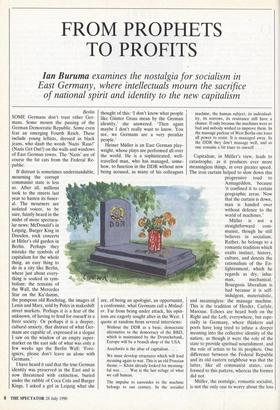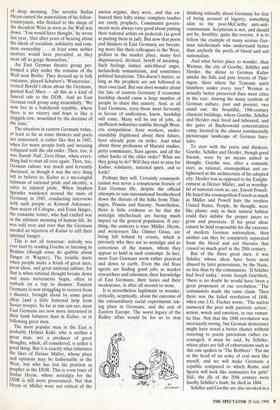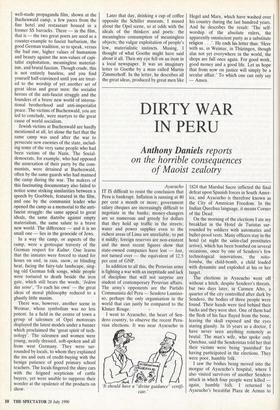FROM PROPHETS TO PROFITS
Ian Buruma examines the nostalgia for socialism in East Germany, where intellectuals mourn the sacrifice of national spirit and identity to the new capitalism
Berlin SOME Germans don't trust other Ger- mans. Some mourn the passing of the German Democratic Republic. Some even fear an emerging Fourth Reich. These include young leftists, dressed in black jeans, who daub the words 'Nazis 'Raus!' (Nazis Get Out!) on the walls and windows of East German towns. The `Nazis' are of course the fat cats from the Federal Re- public.
I have heard it said that the true German identity was preserved in the East and is now threatened with extinction, buried under the rubble of Coca Cola and Burger Kings. I asked a girl in Leipzig what she thought of this: `I don't know what people like Gunter Grass mean by the German identity,' she answered. `Then again maybe I don't really want to know. You see, we Germans are a very peculiar people.'
Heiner Muller is an East German play- wright, whose plays are performed all over the world. He is a sophisticated, well- travelled man, who has managed, some- how, to function in the DDR without now being accused, as many of his colleagues are, of being an apologist, an opportunist, a conformist, what Germans call a Mitlauf- er. Far from being under attack, his opin- ions are eagerly sought after in the West. I quote at random from several interviews:
Without the DDR as a basic, democratic alternative to the democracy of the BRD, which is maintained by the Deutschebank, Europe will be a branch shop of the USA.
Auschwitz is the altar of capitalism. . . .
We must develop structures which will lend meaning again to war. This is an old Prussian theme — Kleist already looked for meaning- ful war. . . . War is the last refuge of what we call human.
The impulse to surrender to the machine belongs to our century. In the socialist
machine, the human subject, its individual- ity, its sorrows, its resistance still have a chance. If only because the machines were so bad and nobody wished to improve them. In the massage parlour of West Berlin one loses all power to resist. It is massaged away. In the DDR they don't massage well, and so one remains a bit truer to oneself . . . .
Muller is not a straightforward com- munist, though he still believes in socialism. Rather, he belongs to a romantic tradition which exalts instinct, history, culture, and detests the rationalism of the En- lightenment, which he regards as dry, inhu- Right and the Left, everywhere, but espe- cially in Germany, where thinkers and poets have long tried to infuse a deeper meaning into the collective identity of the nation, as though it were the role of the state to provide spiritual nourishment, and the role of artists to be its prophets. One difference between the Federal Republic and its old eastern neighbour was that the latter, like all communist states, con- formed to this pattern, whereas the former did not.
Muller, the nostalgic, romantic socialist, is not the only one to worry about the loss of deep meaning. The novelist Stefan Heym cursed the materialism of his fellow- countrymen, who flocked to the shops of the decadent West as soon as the Wall was down. 'You would have thought,' he wrote last year, 'that after years of hearing about the ideals of socialism, solidarity and com- mon ownership . . . at least some nobler motives would have prevailed, as they went off to gorge themselves.'
An East German theatre group per- formed a play under the remains of the Wall near Berlin. They dressed up in folk costumes, played Schubert's 'Winterreise', recited Brecht's ideas about the Germans, quoted Karl Marx — all this as a kind of funeral ode to the DDR. And an East German rock group sang mournfully, 'We now live in a baksheesh republic, where there is no victory and hope is like a sluggish cow, nourished by the doctrine of the state.'
The situation in eastern Germany today, ar least as far as some thinkers and poets are concerned, is rather like that in 1945, when for many people faith and meaning collapsed with the old order. Then, too, it was Stunde Null, Zero Hour, when every- thing had to start all over again. Then, too, German culture was much and fervently discussed, as though it was the only thing left to believe in; Kultur as a meaningful talisman of national pride and identity, a salve to injured pride. When Stephen Spender wandered around the ruins of Germany in 1945, conducting interviews with such people as Konrad Adenauer, then mayor of Cologne, and Ernst Ringer, the romantic writer, who had exalted war as the ultimate meaning of human life, he was told over and over that the Germans needed an injection of Kultur to still their spiritual hunger.
This is not all nonsense: nobody was ever hurt by reading Goethe or listening to Brahms (though some do quibble about Jfinger or Wagner). The trouble starts when people make a fetish of great men, great ideas, and great national culture, for that is when rational thought breaks down and mass movements begin, often to embark on a trip to disaster. Eastern Germany is now struggling to recover from a disaster, brought about by some great ideas (and a little fraternal help from Soviet troops). So far as one can see, most East Germans are now more interested in their bank balances than in Kultur, or in following great men.
The most popular man in the East is probably Helmut Kohl, who is neither a great man, nor a producer of great thoughts, which, all considered, is rather a good thing. But it is exactly what infuriates the likes of Heiner Muller, whose plays and opinions may be fashionable in the West, but who has lost his position as prophet in the DDR. This is even truer of Stefan Heym, whose nostalgia for the DDR is still more pronounced. Not that Heym or Muller were not critical of the ancien regime, they were, and this en- hanced their lofty status: complete toadies are rarely prophets. Communist govern- ments were always very good about putting their national artists on pedestals (as good as putting them in jail). But now that poets and thinkers in East Germany are becom- ing more like their colleagues in the West, pedlars in the market place, many feel dispossessed, déclassé, bereft of meaning. Such feelings induce anti-liberal angst, melancholy romanticism, and sometimes political fanaticism. This doesn't matter, as long as the prophets are not followed in their own land. But one does wonder about the fate of eastern Germany if economic hardship should cause a large number of people to share this anxiety. And, as all East Germans, even those most fervently in favour of unification, know, hardship will come. Many will be out of jobs, as inefficient industries tumble through West- ern competition. Irate workers, under- standably frightened about their future, have already gone on strike. And what about those professors of Marxist studies, petty commissars, Stasi agents, and all the other hacks of the older order? What are they going to do? Will they start to pine for Kultur, solidarity, national spirit, and so forth?
Perhaps they will. Certainly cosmopoli- tanism was never a conspicuous feature of East German life, despite the official attempts to ram international brotherhood down the throats of the folks from Thur- ingen, Prussia and Saxony. Nonetheless, there is little evidence so far that the nostalgic intellectuals are having much impact on the general population. If any- thing, the contrary is true: Milner, Heym, and westerners like Gunter Grass, are being left behind by events, which is precisely why they are so nostalgic and so censorious of the masses, whom they appear to hold in such contempt. In fact, most East Germans seem rather practical and down to earth. Even the old Stasi agents are finding good jobs as market researchers and salesmen; their knowledge of East Germans, their tastes and their weaknesses, is after all second to none.
It is nevertheless legitimate to wonder, critically, sceptically, about the outcome of the extraordinary social experiments tak- ing place in Germany, and the rest of Eastern Europe. The worst legacy of the Ridley affair would be for us to stop thinking critically about Germany for fear of being accused of bigotry, something akin to the post-McCarthy anti-anti- communism. Scepticism is not, and should not be, hostility; quite the reverse, it is to follow the example of many serious Ger- man intellectuals who understand better than anybody the perils of blood and soil nationalism.
And what better place to wonder, than Weimar, the city of Goethe, Schiller and Herder, the shrine to German Kultur amidst the hills and pine forests of Thiir- ingen, there where the Teutonic spirit slumbers under every tree? Weimar is actually better preserved than most cities in the east. Among the many symbols of German culture, past and present, two stand out: the beautiful, 19th-century classicist buildings, where Goethe, Schiller and Herder once lived and laboured, and the gates of Buchenwald concentration camp, located in the almost sentimentally picturesque landscape of German fairy- tales.
To start with the poets and thinkers: Goethe, Schiller and Herder, though good friends, were by no means united in thought. Goethe was, after a romantic start, as rational, cosmopolitan and en- lightened as the architecture of his adopted city. Herder was as opposed to the Enlight- enment as Heiner Muller, and as worship- ful of national roots as, say, Enoch Powell. He hated the cosmopolitan French as much as Muller and Powell hate the rootless United States. People, he thought, were like plants: only in their natural habitat could they imbibe the proper juices to grow and procreate. If his great ideas cannot be held responsible for the excesses of modern German nationalism, then neither can they be completely separated from the blood and soil theories that caused so much grief in the 20th century.
But of the three great men, it was Schiller whose ideas have been most abused by later generations, by the Nazis, no less than by the communists. 'If Schiller had lived today,' wrote Joseph Goebbels, 'there is no doubt he would have been a great proponent of our revolution.' The communists made the same claim. Then there was the failed revolution of 1848, when one J.G. Fischer wrote, 'The nation answered the poet with patriotic action', action, words and emotion, in one roman- tic blur. Not that the 1848 revolution was necessarily wrong, but German democracy might have stood a better chance without resorting to poetic patriotism rather en- couraged, it must be said, by Schiller, whose plays are full of exhortations such as this one spoken in 'The Robbers': 'Put me at the head of an army of real men like myself, and we will make Germany a republic compared to which Rome and Sparta will look like seminaries for girls!' Still, the ills of the 20th century were hardly Schiller's fault; he died in 1804.
Schiller and Goethe are also invoked in a
well-made propaganda film, shown at the Buchenwald camp, a few paces from the fine hotel and restaurant housed in a former SS barracks. There — in the film, that is — the two great poets are used as a counter-example to fascist barbarism, the good German tradition, so to speak, versus the bad one, higher values of humanism and beauty against the non-values of capi- talist exploitation, meaningless material- ism, and brutal fascism. Though crude, this is not entirely baseless, and you find yourself half-convinced until you are treat- ed to the worship of yet another set of great ideas and great men: the socialist heroes of the anti-fascist struggle and the founders of a brave new world of interna- tional brotherhood and anti-imperialist peace. The victims of Buchenwald, you are led to conclude, were martyrs to the great cause of world socialism.
Jewish victims at Buchenwald are hardly mentioned at all, let alone the fact that the same camp was used after the war to persecute new enemies of the state, includ- ing some of the very same people who had been victims of the Nazis. The Social- democrats, for example, who had opposed the annexation of their party by the com- munists, were detained at Buchenwald, often by the same guards who had manned the camp during the war. The makers of this fascinating documentary also failed to notice some striking similarities between a speech by Goebbels, featured in the film, and one by the communist leader who opened the camp as a memorial to the anti- fascist struggle: the same appeal to great ideals, the same diatribe against empty materialism, the same salute to a brave new world. The difference — and it is no small one — lies in the genocide of Jews.
In a way the camp, or aspects of the camp, were a grotesque travesty of the German respect for Kultur. One learns that the inmates were forced to stand for hours on end, in rain, snow, or blinding heat, facing the fairy-tale landscape, sing- ing old German folk songs, while people were tortured to death beside the iron gate, which still bears the words, Vedem das seine', 'To each his own' — the great ideas of moral philosophy reduced to a ghastly little maxim.
There was, however, another scene in Weimar, whose symbolism was no less potent. In a field in the centre of town a group of salesmen of Opel motorcars displayed the latest models under a banner which proclaimed the 'great spirit of tech- nology'. The salesmen and women were young, neatly dressed, soft-spoken and all from west Germany. They were sur- rounded by locals, to whom they explained the ins and outs of credit-buying with the benign patience of good primary school teachers. The locals fingered the shiny cars with the feigned scepticism of cattle buyers, yet were unable to suppress their wonder at the opulence of the products on show. Later that day, drinking a cup of coffee opposite the Schiller museum, I mused about the Opel scene, so at odds with the ideals of the thinkers and poets: the meaningless consumption of meaningless objects; the vulgar exploitation of people's low, materialistic instincts. Musing, I thought of what Goethe might have said about it all. Then my eye fell on an item in a local newspaper. It was an imaginary letter to Goethe by a man called Martin Zimmerhoff. In the letter, he describes all the great ideas, produced by great men like Hegel and Marx, which have washed over his country during the last hundred years. And he describes the result: 'The self- worship of the absolute rulers, the apparently omniscient party as a substitute religion . . .'. He ends his letter thus: 'Here with us, in Weimar, in Thuringen, though alas not yet everywhere in the world, the shops are full once again. For good work, good money and a good life. Let us hope that from now on justice will simply be a secular affair.' To which one can only say — Amen.




















































 Previous page
Previous page